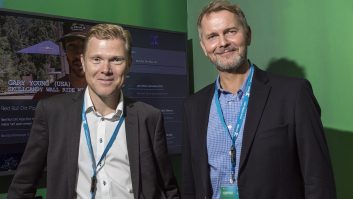Cyrus Uible, solution architect, WorldCast
Talk us through an average day in your role
One of my favorite things about being a solution architect for a growing company are the variety of things I get to do on a day-to-day basis. My title is really only one role I take on. It basically is problem solving (like many of our roles in the end). A current or potential customer has a problem that they need to solve and I get to try and solve it by putting all the tools together that they will need.
My main focus is our NMS platform, Kybio. But within that platform are a lot of sub-tools, such as drivers and visual layouts that need to be designed to meet the needs of the customer. So part of what I get to do is design parts of the solution, how they will work, how they will look, how they will interact with other pieces of the network.
Sometimes I will also write the code to implement the solution and other times, because of the complexity, I will rely on the help from other members of the development team.

Other days I might be more focused on support. A current customer has an issue that they need to have resolved. It might be something they notice happening in the software but just do not understand why or what it is. It could be some training is needed to answer a question. On days like this I put on my troubleshooting hat and help to work with the customer to find the answer. Sometimes I can find it on my own and sometimes I must ask for help internally. Support can be quite satisfying because in the end both you and the customer learn something.
I also get to put on my marketing hat by helping to build content for our broader industry exposure. This could take the form of writing white papers or presentations for our website.
I also wear a sales hat by giving live online demos to potential customers and dealers of our company’s solutions. I need to be able to listen to the needs of the customer and then show them how our products can meet them.
I’m also very fortunate to be able to travel occasionally for this job. Sometimes it is for a trade show where I’m giving demos at our booth, other times it is to visit customers, either for on-site training, engineering, or sales meetings. In a world where we all do so many virtual meetings, I feel that face-to-face meetings (especially with customers) have become even more powerful.
How did you get started in the media industry?
I hope it doesn’t sound too cliché but it really was by luck. I graduated from college with a major in Sociology. I had also taken several computer science classes which I was enjoying. My senior year I had a part-time job working for the University alumni relations office for their IT help desk, adding PCs to the network, settings up printers, helping people with their email. The regular network stuff. I really enjoyed it. I realised there was this whole world of IT industry that wasn’t necessarily only software development but also the deployment of that software.
So now the lucky part. When I graduated, I decided I would try to find a job in technology and right away I found an opening for a software support specialist working for a software company that primarily made software for the radio industry. That company (and I along with it) went on to expand into TV and media.
What training did you have before entering the industry?
In college I took computer science courses. For hands-on technology experience I worked for a help desk. Although I didn’t really consider it at the time, it gave me a foundation both in deep technical understanding and also the support/bedside manner you need to be successful in customer-facing positions.
Half of what I do today is based on my technical knowledge and experience. The other half is based on communication skills with other people. Both are equally important.
Why do you enjoy working in the industry?
Mostly because of the people. They’re fun. And because of the technology. It’s also fun. Everything is always evolving so you get to learn new things all the time. In fact, I think it’s a requirement for anything to work in this industry, you have to be open to change and willing to learn new things all the time.
What is working well this year won’t necessarily work well next year so we always have to be willing to adapt. Being “agile” in our mindset is very important.
What piece of advice would you offer someone looking to explore a role similar to yours?
Try to learn something new every day. Don’t be afraid to make mistakes. Be true to yourself and kind to everyone. Those in themselves will take you far. If in particular you want to get into a role like mine I’d suggest you first find a role in technical support. These jobs tend to be entry-level where you can quickly build both your technical and people skills. You’ll be amazed at the doors that start to open from there.






